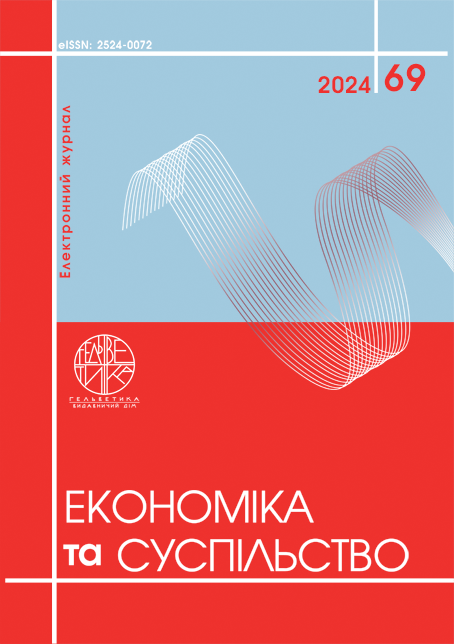SUSTAINABLE TOURISM DEVELOPMENT IN THE DIGITAL ERA: THE EVOLUTION OF SMART DESTINATIONS
Abstract
Smart tourism represents an innovative concept for developing tourist destinations by leveraging modern digital technologies to enhance the efficiency and quality of tourism services. Key elements of this concept include implementing digital tools for managing tourist flows, booking transportation and accommodations, providing access to information about cultural and tourist sites, and applying interactive technologies like mobile apps, virtual and augmented reality. Moreover, smart tourism focuses on designing personalized travel itineraries tailored to individual needs, promoting sustainable development and ecological stability, improving tourist safety through modern monitoring systems, and preserving the sociocultural uniqueness of regions by supporting local communities and heritage conservation. This study emphasizes the integration of smart tourism with smart city and smart destination concepts to develop strategies for economic growth and sustainable social development in regions. International research highlights the role of information technologies, artificial intelligence, and big data in creating innovative tourism experiences. The research objective is to analyze the sustainable development of tourism in the digital era and identify innovative approaches for creating smart destinations that integrate modern digital technologies. Key directions for adopting artificial intelligence include personalization of customer services, responding to crises, optimizing tourist flows, and automating service processes. The findings demonstrate the importance of integrating smart tourism within the broader framework of smart cities to create a holistic system. Ukrainian cities like Kyiv, Lviv, and Odesa are actively adopting smart technologies, including AI, for improving tourism experiences, indicating a positive trajectory toward smart tourism. These advancements support the transition to «Tourism 4.0», enhancing the attractiveness and sustainability of tourism destinations while fostering economic and social development through strategic stakeholder partnerships.
References
Gretzel U., Koo C. Smart Tourism Cities: A Duality of Place Where Technology Supports the Convergence of Touristic and Residential Experiences. Asia Pacific Journal of Tourism Research. 2021. 26(4). Р. 1-13.
Gretzel U., Werthner H., Koo C., Lamsfus C. Conceptual foundations for understanding smart tourism ecosystems. Computers in Human Behavior. 2015. 50. Р. 558-563
Gretzel U., Scarpino Johns M. Destination Resilience and Smart Tourism Destinations. Tourism Review International. 2018. 22(3). Р. 263-276.
Gretzel U. From smart destinations to smart tourism regions. Investigaciones Regionales. 2018. 42. Р. 171-184.
Smart Tourism Development / Gretzel U., Dieke P., King B. & Sharpley R. Tourism in Development: Reflective Essays. 2021. Р. 159-168.
Gretzel U., Collier de Mendonça M. Smart Destination Brands: Semiotic analysis of visual and verbal signs. International Journal of Tourism Cities. 2019. 5(4). Р. 560-580.
Buhalis D., Amaranggana A. Smart tourism destinations enhancing tourism experience through personalization of services. In Information and Communication Technologies in Tourism. Springer: Cham, Germany. 2015. Р. 377–389
Boes K., Buhalis D., Inversini A. Smart tourism destinations: Ecosystems for tourism destination competitiveness. International Journal of Tourism Cities. 2016. Vol. 2(2). Р.108 – 124.
Bilotta E., Bertacchini F., Gabriele L., Giglio S., Pantano P.S., Romita T. Industry 4.0 technologies in tourism education: Nurturing students to think with technology. Journal of Hospitality, Leisure, Sport & Tourism Education. 2021. Vol. 29. URL: https://doi.org/10.1016/j.jhlste.2020.100275 (дата звернення: 10.11.2024).
Кара О., Міхо О., Растворова М. Стан та перспективи розвитку смарт-туризму: світовий досвід та українські перспективи (на прикладі міста Києва як туристичної дестинації). Вчені записки Університету «КРОК». 2024. 1(73). С. 127–131. URL: https://doi.org/10.31732/2663-2209-2024-73-127-131 (дата звернення: 10.11.2024).
Марусей Т. В. Діджиталізація туристичного сектору як інструмент розвитку в сучасних умовах. Ефективна економіка. 2020. № 8. URL: http://www.economy.nayka.com.ua/?op=1&z=8116 (дата звернення: 10.11.2024).
Рябєв А., Тонкошкур М., Кравцова С. Концепція «Smart сity» та її вплив на сферу туризму в умовах цифрової економіки. Економіка та суспільство. 2022. (35). URL: https://doi.org/10.32782/2524-0072/2022-35-30 (дата звернення: 10.11.2024).
Gretzel U., Koo C. (2021) Smart Tourism Cities: A Duality of Place Where Technology Supports the Convergence of Touristic and Residential Experiences. Asia Pacific Journal of Tourism Research. 26(4). Р. 1-13.
Gretzel U., Werthner H., Koo C., Lamsfus C. (2015). Conceptual foundations for understanding smart tourism ecosystems. Computers in Human Behavior. 50. Р. 558-563
Gretzel U., Scarpino Johns M. (2018) Destination Resilience and Smart Tourism Destinations. Tourism Review International. 22(3). Р. 263-276.
Gretzel U. (2018). From smart destinations to smart tourism regions. Investigaciones Regionales. 42. Р. 171-184.
Smart Tourism Development (2021) / Gretzel U., Dieke P., King B. & Sharpley R. Tourism in Development: Reflective Essays. Р. 159-168.
Gretzel U., Collier de Mendonça M. (2019) Smart Destination Brands: Semiotic analysis of visual and verbal signs. International Journal of Tourism Cities. 5(4). Р. 560-580.
Buhalis D., Amaranggana A. (2015) Smart tourism destinations enhancing tourism experience through personalization of services. In Information and Communication Technologies in Tourism. Springer: Cham, Germany. Р. 377–389
Boes K., Buhalis D., Inversini A. (2016) Smart tourism destinations: Ecosystems for tourism destination competitiveness. International Journal of Tourism Cities. Vol. 2(2). Р.108 – 124.
Bilotta E., Bertacchini F., Gabriele L., Giglio S., Pantano P.S., Romita T. (2021) Industry 4.0 technologies in tourism education: Nurturing students to think with technology. Journal of Hospitality, Leisure, Sport & Tourism Education. Vol. 29. URL: https://doi.org/10.1016/j.jhlste.2020.100275 (date of access: 10.11.2024)
Kara O., Mikho O., Rastvorova M. (2024) Stan ta perspektyvy rozvytku smart-turyzmu: svitovyi dosvid ta ukrainski perspektyvy (na prykladi mista Kyieva yak turystychnoi destynatsii) [The Current State and Prospects for the Development of Smart Tourism: Global Experience and Ukrainian Perspectives (Using the Example of Kyiv as a Tourist Destination)]. Vcheni zapysky Universytetu «KROK». 1(73). S. 127–131. URL: https://doi.org/10.31732/2663-2209-2024-73-127-131 (date of access: 10.11.2024)
Marusei T. (2020) Didzhytalizatsiia turystychnoho sektoru yak instrument rozvytku v suchasnykh umovakh [Digitalization of the tourist sector as a tool of development in modern conditions]. Efektyvna ekonomika № 8. URL: http://www.economy.nayka.com.ua/?op=1&z=8116 (date of access: 10.11.2024)
Riabiev A., Tonkoshkur M., Kravtsova S. (2022) Kontseptsiia «Smart sity» ta yii vplyv na sferu turyzmu v umovakh tsyfrovoi ekonomiky [ The Concept of «Smart City» and Its Impact on Tourism in the Digital Economy]. Ekonomika ta suspilstvo. (35). URL: https://doi.org/10.32782/2524-0072/2022-35-30 (date of access: 10.11.2024)

This work is licensed under a Creative Commons Attribution 4.0 International License.


